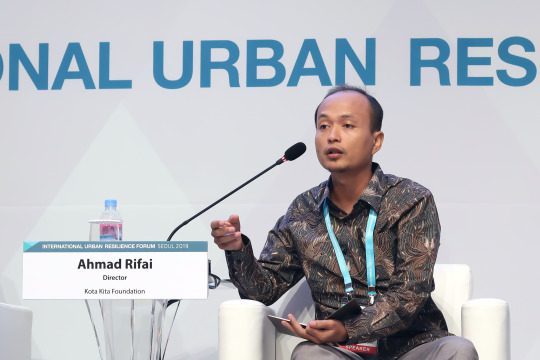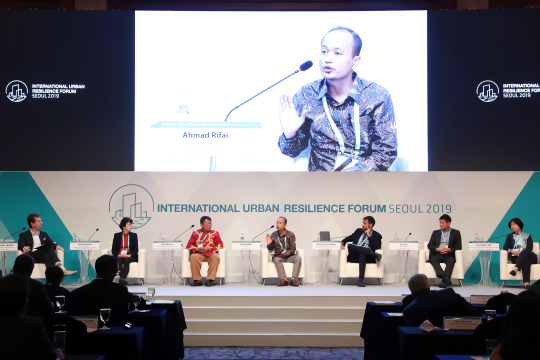Type
news

Kota Kita Spoke at a Panel Titled “Strengthening Urban Resilience through Smart Technologies and Governance” at a Forum Hosted by Seoul Metropolitan Government and United Nations Disaster Risk Reduction (UNDRR)
In September 23-24, 2019, the International Urban Resilience Forum in Seoul, hosted by Seoul Metropolitan Government and UNDRR, marked the launch of a platform to design integrated solutions and share information on urban resilience through sessions and discussions among diverse stakeholders. The 2-day Forum introduced trends and best practices and discuss the ways in strengthening resilience and sustainable development. It focused on the roles of cities and local governments, while further enhancing global partnership for city resilience by connecting experts, practitioners, and civil society from around the world to share good practices in strengthening urban resilience.
Ahmad Rifai of Kota Kita was invited to speak at a panel titled “Strengthening Urban Resilience through Smart Technologies and Governance”, along with Hero Novian, Head of Section of Rehabilitation & Logistic, Fire and Disaster Management of Bandung City, Massimo Castiglione, Special Advisor to the Mayor on Environment and Resilience, Roma Capitale, Italy, Shu Zhu, Regional Director, ICLEI East Asia Secretariat, and Lyu Hyeon-Suk, Director of the Center for International Development and Cooperation, Korea Institute of Public Administration.

Rifai’s presentation focused on the importance of citizenship and facilitation of active community participation in the process of urban resilience strategy planning and implementation. It is a reflection from years of Kota Kita’s involvement in the Climate Change Resilience initiatives in rapidly urbanizing Indonesian cities.
The process of building city resilience include physical infrastructure, strengthening of institutions, building knowledge, led by the active participation of citizens and communities. However, many city governments and experts often focus on fixing and building the large-scale infrastructures, while bypassing the process of consultation and discussions with citizens and communities. Cities may develop sea wall, wave breakers, and complex water management systems, as steps to reduce vulnerabilities from climate change, but without proper consultation, these projects can bring harmful impact to the lives of citizens, especially the poor, potentially exacerbating poverty and causing displacement.
The presentation highlighted the importance of community-based resilience strategy, emphasized that it is inclusive citizenship, that is nurtured by facilitation of active participation that has high potential to be a longer-lasting institution of a resilient community. Based on Kota Kita’s experience in Makassar, Pekalongan, and Kupang, it is in the process of co-learning and co-design with the community, where we can determine relevant local practices, capacities, and innovations that can become embedded in the city’s resilience strategy. Finally, the presentation concluded with a call to continue multi-stakeholders, interdisciplinary collaboration, between government, citizens, and civil society, to improve urban resilience.

In the end, the Seoul Declaration for Strengthening Urban Resilience called for participating cities and organizations to agree on:
(1) Investing more in Disaster Risk Reduction efforts;
(2) Strengthening disaster risk governance;
(3) Enhancing disaster preparedness for effective response; and
(4) Enhancing international cooperation and sharing of lessons learned.
